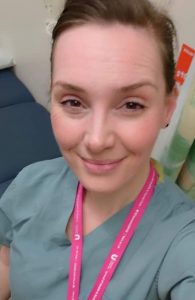Former NHS nurse, Katrina Boulton, saw the difference medical cannabis made to her epileptic daughter’s quality of life – now she’s helping others access it, in her new role as clinical nurse at The Medical Cannabis Clinics.
As a nurse working predominantly in palliative care and chronic pain in the NHS, Katrina Boulton was aware that many of her patients self-medicated and found cannabis helpful for managing their symptoms.
But when her own daughter, Marley was diagnosed with a genetic epilepsy condition at the age of two, she became much more invested.
“I started to Google treatments for epilepsy, because you look for anything,” says Katrina.
“The more that I looked, the more evidence I found worldwide, especially for kids with refractory epilepsy.
“By now she had tried six or seven antiepileptic medications and had various side effects from those. She was still having multiple seizures throughout the day and night. [Cannabis] was something I really wanted for her.”
Marley was prescribed medical cannabis during lockdown, in March 2020 and Katrina says she saw an improvement within a few days.

Katrina Boulton and daughter, Marley.
“Within four or five days we saw an improvement in her balance, she was able to sit up and could walk, although she was unsteady,” she explains.
“Her seizures started to reduce in severity after a couple of weeks and after six weeks, they started to reduce quite dramatically in frequency. She still had one or two a day, but some days she was completely seizure free.”
Marley, now seven, is able to attend school with a support worker and maintain a more normal quality of life.
“The benefits that I’ve seen in my daughter, as a caregiver, are amazing,” continues Katrina.
“She still has additional needs, she’s autistic which is part of the spectrum of a genetic disorder, but she now lives a more normal life. It allows her to do things like go to school, which has been really good for her quality of life. She’s able to walk and sometimes she even runs so fast you can’t catch her.”
After her daughter’s diagnosis, Katrina studied for a post-graduate certificate in nursing in epilepsy, writing her final assignment on CBD in Dravet syndrome, around the time that Epidiolex emerged on the market. It was during this research that she realised there was a role for nursing in cannabis medicine.
Katrina worked on the frontline throughout the height of the coronavirus pandemic, but last year she made the decision to leave the NHS after securing her ideal job, as a clinical nurse advisor with The Medical Cannabis Clinics.
“It’s a big leap to leave the NHS and it has to be for something that you really believe in,” she says.
“The only thing that I wanted to do was to be a nurse in this field. I was quite proud to say ‘yes, I’m leaving the NHS but I’m going on to this really exciting opportunity to support patients with medicinal cannabis’.
“A lot of colleagues were really supportive – I did expect a few more eye rolls – but this is something I had spoken about at length and I worked in a chronic pain environment, so it didn’t come as a surprise. They thought it was the perfect job for me.”
Katrina adds: “There’s still hesitancy from some people when you tell them. I still have people say ‘what you’re a nurse in cannabis medicine?’ It’s a prescribed medicine and it has been for nearly four years, but that’s what excites me about being one of these pioneers. I want to advocate and educate so that we can open up the eyes of colleagues who might be a bit skeptical of this as a medicine.”

Katrina was a palliative care nurse in the NHS
In her role at The Medical Cannabis Clinics, Katrina is a vital support for patients, particularly those who are new to this medicine. She will be in touch with them from the beginning of their journey – before their initial consultation – throughout, acting as a liaison between the patient and their doctor to help them get the best out of their care.
As well as triaging appointments, she’ll personally check in with patients to make sure they understand about dosing, that they know what vaping devices are available to them and how to maintain them, what side effects to look for, and also just to monitor their progress and improvements.
“I find that there are a lot of patients who are totally naive to cannabis and it’s those who we are there to support through the whole process, because it’s a completely new thing to them. I try to make it tangible, to destigmatise and demystify cannabis as a medicine,” Katrina explains.
“Patients can book an appointment with me any time, even if they are a historical patient, they might have a change of prescription or have side effects they never had before, or have worries about something such as driving or travel.
“I also review their progress, because it’s important for them to reflect on that as a patient and to recognise how far they have come.”
Nurses are still in the minority of healthcare professionals moving into the sector, but Katrina is keen for the profession to have a more prominent role in cannabis medicine.
“If you look at any other healthcare setting, you have the consulting team and you have the nurses who can act as that liaison between the patient and consultant. I think that’s something that’s been missing in cannabis,” she says.
“To be that source of support in between each step for patients, I think that’s where a nurse’s role really sits.”
The benefits she has seen in a professional capacity have only compounded her passion for making this treatment more widely available.
“It’s interesting as a nurse that it has many different facets to what it can help patients with, that’s exciting, especially in chronic conditions where patients have exhausted a lot of treatments. When you have to tell a patient that you know we tried all the available options that can be so disheartening.”
She continues: “The feedback I get from patients is amazing. Everything in medicine is about quality of life, that’s what we strive for, and cannabis seems to be a really good medicine to help with that.”
While around 10,000 patients now have legal prescriptions for cannabis-based medicines in the UK, the industry is in desperate need of more prescribers, particularly in the field of paediatric epilepsy.
As a parent and a healthcare professional, Katrina wants to see more clinicians coming forward and hopes to support any of her healthcare colleagues who would be willing to.
“As a professional, I can understand the reticence to prescribe a relatively new drug that’s still off licence in children, but as a parent of a child with a neurological condition who has this medication, I would be so disappointed if she had not had access to that, because it has been life changing,” she says.
“What I would like to see is clinicians with paediatric experience who are willing to try prescribing for paediatric patients. We just need to get some new blood on board, who will then advocate to the peers in their own field and that’s how we progress.”
As the industry does progress, Katrina is keen to reconnect with her colleagues in the NHS and to be able to help bridge the gap between conventional medicine and cannabis.
“I miss the NHS but I absolutely love what I do now. I hope to get back in touch with clinicians and share how well things are going, because we’ve all met patients in the NHS that have tried all of the available treatments and there’s literally nothing else for them to try,” she says.
“I want to be part of the movement progressing medicinal cannabis so that it’s something that is considered as a treatment and not the last resort. Why do we have to put patients through a lot of treatments that don’t work and have quite bad side effects, for them to get to a point where we try a relatively safe medicine?
“I want to empower these patients who have had such difficult journeys, whether it’s children with refractory epilepsy or palliative care or chronic pain. I want to be part of something that helps these patients and I want to help move this forward and open up access.”
Find out more about Kat here
To book an appointment with The Medical Cannabis Clinics visit www.themedicalcannabisclinics.com
- Medical leaders explore vital role of nurses in cannabis treatment
- Why medical cannabis needs more nurses
- From the COVID frontline to the forefront of medical cannabis
- New study explores effects of THC in Alzheimer’s patients
- Two years on Project Twenty21 helps almost 2,000 patients access medical cannabis
The post Why I left the NHS for a new role as a cannabis nurse appeared first on Cannabis Health News.

